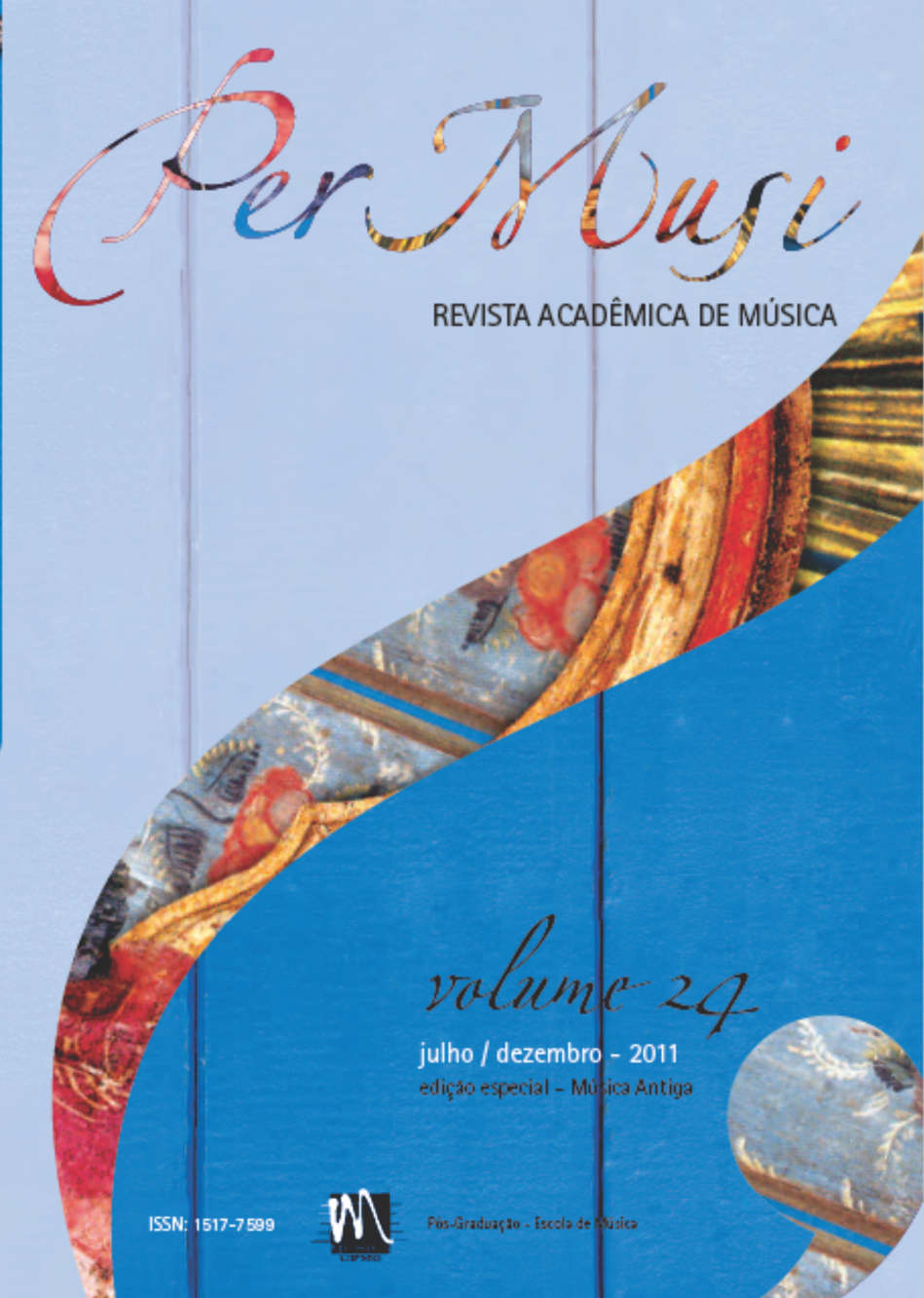A Retórica do silêncio
Palavras-chave:
Retórica, Música, Silêncios, Pausas, BarrocoResumo
A teoria da retórica na música barroca revela-se, de modo geral, interpretativa e heterogênea, não havendo uma linha de pensamento fixa. Sugerindo uma visão retórica plural, propõe-se diversos tipos de categorização bem como a coexistência de interpretações. Para apresentar os desdobramentos dos objetivos estéticos da meraviglia, que focam o escopo pragmático de deslumbrar inesperadamente criando percepções chocantes de admiração, busca-se um equilíbrio entre a teoria e a prática através de exemplificações musicais. A retórica é vista como a energia inerente na emoção e no pensamento, transmitida por meio de um sistema de signos, entre os quais a música, com o objetivo de influenciar terceiros em suas decisões e ações.
Referências
BACH, Johan Sebastian. Messe H-moll, BWV 232. (Leipzig, Bach Gesellschaft). Dover Publications, New York, s.d.
______. Johannes Passion, BWV 245. Leipzig, Bach Gesellschaft.
BARTEL, Dietrich. Musica Poetica; Musical-Rhetorical Figures in German Baroque Music. Lincoln, Nebraska, University of Nebraska Press, 1997.
BURMEISTER, Joachim. Musical Poetics (1606). Londres, Yale University Press, 1993. Tradução: Benito V. Rivera. Editor: Claude V. Palisca.
BURTON, Gideon.Silva. Rhetoricae. http://humanities.byu.edu/rhetoric/silva.htm. (Acesso 9/07/2009).
CAGE, John. Silence. Middletown, Connecticut. Wesleyan University Press, 1939.
CHERCHI, Paolo. Marino and the meraviglia. In:, Massimo Ciavolella e Patrick Coleman. Culture and authority in the baroque. University of Toronto Press, 2005. p.63-72.
CAMERON, Jasmin. Rhetoric and Music: The Influence of a Linguistic Art. In:, John Williamson (Editor) Words and Music. Liverpool University Press, 2005. M. May & Jacob Wisse. p.28-72.
HÄNDEL, Georg Friedrich. Concerto Grosso Op. 6 No. 5. Bärenreiter, 1985.
MAHLER, Gustav. Adagietto da Sinfonia No. 5. Lepzig, C. F. Peters, 1904.
______. Sinfonia No. 5. Wiener Philarmoniker. Diretor: Leonard Bernstein. Deutsche Grammophon, 1988.
MANCINI, Francesco. Sonata IV. Amadeus Verlag, 1999.
MONTEVERDI, Claudio. L’Orfeo Favola in Musica. Editor: Philip Legge. Edição on-line: http://www.cpdl.org/wiki/index.php/L%27Orfeo. Acessado 19/07/2009.
QUINTILIANO, Marcus Fabius. Institutio Oratoria. Harvard University Press, 1920. Tradução: H. E. Butler.
SIMPSON, D. P. Cassell’s Latin Dictionary. New York, 1968.
TELEMANN, Georg Philipp. Sonata III em Fá menor, TWV 41:f1. Editio Musica Budapest, 1995.
VILLAVICENCIO, Cesar. The Discourse of Free Improvisation; A Rhetorical Perspective on Free Improvised Music. PhD Thesis. Norwich, 2008. http://cevill.com/phdcesar
______. Curso de improvisação contemporânea. http://cevill.com/UNLV06Apo1.mp3, http://cevill.com/UNLV06Apo2.mp3. Universidade de Nevada Las Vegas, EUA (s.d.).
WILLIAMS, Peter. Figurenlehren from Monteverdi to Wagner. 1: What is ‘Figurenlehre’?, The Musical Times, Vol. 120, No. 1636 (Jun., 1979) p.476-479.
Downloads
Publicado
Edição
Seção
Licença

Este trabalho está licenciado sob uma licença Creative Commons Attribution 4.0 International License.

Exceto onde está indicado, o conteúdo neste site está sob uma Licença Creative Commons - Atribuição 4.0 Internacional.












